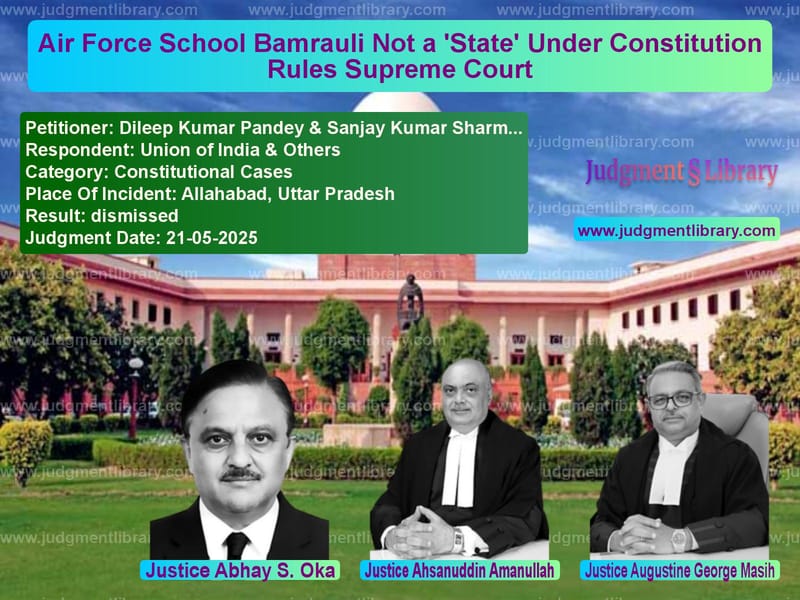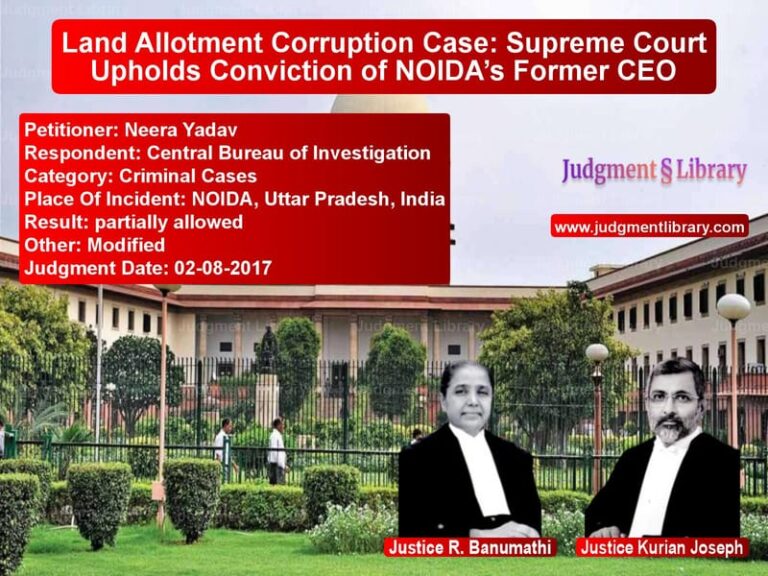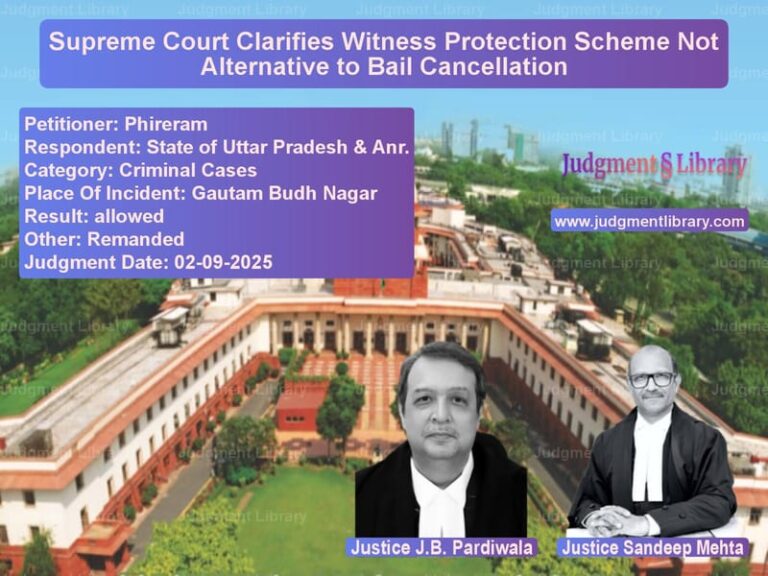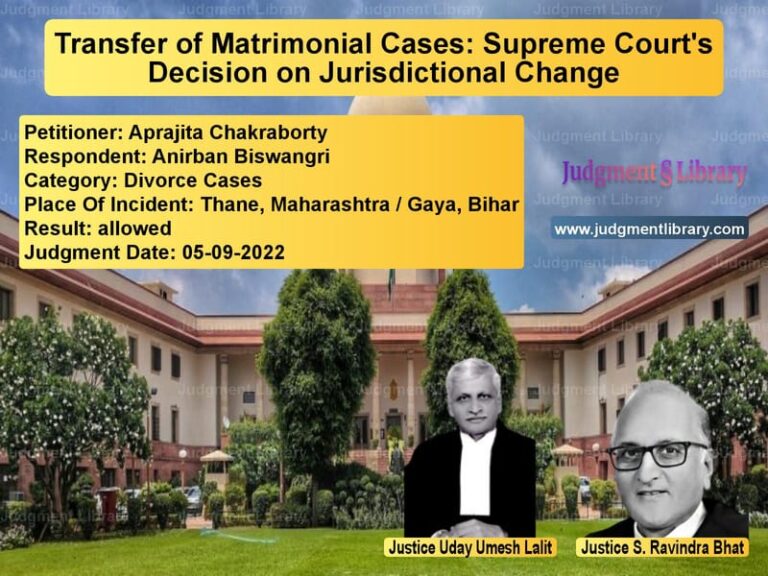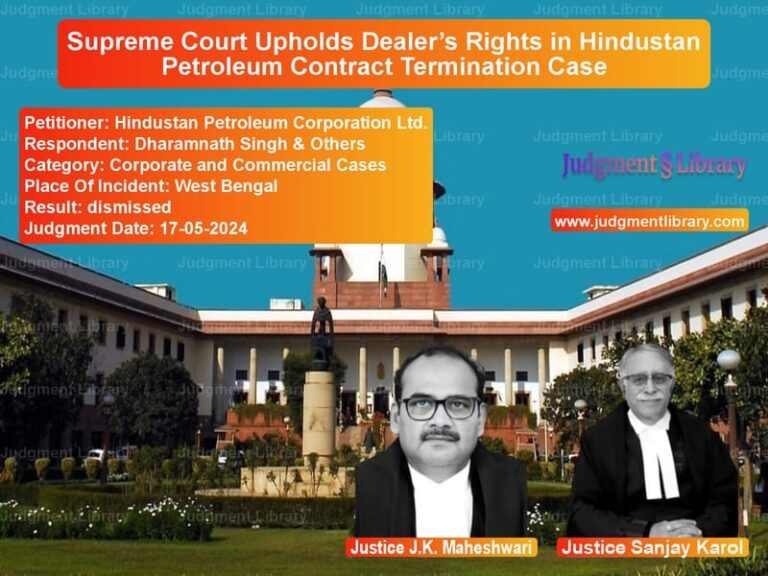Air Force School Bamrauli Not a ‘State’ Under Constitution Rules Supreme Court
In a significant ruling that clarifies the legal status of defense establishment schools, the Supreme Court of India has delivered a split verdict on whether Air Force schools qualify as ‘state’ under Article 12 of the Constitution. The case involved two teachers from Air Force School Bamrauli in Allahabad who challenged their termination and disciplinary proceedings, arguing that the school was amenable to writ jurisdiction under Article 226.
The legal battle began when Dileep Kumar Pandey, appointed as a trained graduate teacher in physical education in 2005, was declared surplus in 2007. Similarly, Sanjay Kumar Sharma, who served as a post-graduate teacher since 1993 and later as officiating Principal, faced disciplinary proceedings and eventual termination. Both teachers approached the Allahabad High Court, where initially a Single Judge ruled in their favor, holding that the Air Force School was indeed a ‘State’ under Article 12. However, this decision was overturned by a Division Bench, leading to the Supreme Court appeals.
The appellants’ senior counsel presented compelling arguments about the school’s connection to the Indian Air Force. “The primary function of the Air Force schools is the promotion of education, fine arts and culture, mainly amongst the past and present employees of the IAF, their families and children,” he submitted. He emphasized that “the documents on record clearly show that the Air Force headquarters exercises dominant control over the administration and functioning of the Air Force schools.” The counsel pointed to the school’s own application to CBSE for affiliation where it claimed to be “fully financed by the IAF” and noted that “all Air Force school buildings have been constructed using Public Funds under the authorisation of the Ministry of Defence.”
Additional Solicitor General representing the respondents countered these arguments vigorously. She explained that “Air Force Schools are governed by Non-Public Funds of the Forces” and emphasized that “the schools have sources of income that come from Tuition fees, Interest, Activity fees, Admission fees, Development fees, Computer fees, and miscellaneous fees.” She relied heavily on precedent, arguing that “the entire issue is covered against the appellants by the decision of this Court in the case of Army Welfare Education Society, New Delhi v. Sunil Kumar Sharma & Ors.”
Justice Abhay S. Oka, writing the majority opinion, conducted a detailed analysis of the factual matrix and legal principles. The Court examined whether the Indian Air Force exercised “financially, functionally and administratively dominated by or under the control of the Government. Such control must be particular to the body in question and must be pervasive.” This test, established in Pradeep Kumar Biswas v. Indian Institute of Chemical Biology, became the cornerstone of the Court’s analysis.
The majority found that while the school building might have been constructed using public funds and some funds originated from Army Welfare Society, “it cannot be said that the State or the IAF has any control, let alone all-pervasive control, over the school.” The Court noted that “the Education Code, which applies to Air Force Schools, is not a statutory code that has the force of law” and that “the audited accounts of the school for the period from 2019-20 to 2023-24 indicate that no public funds or grants were received by the school.”
Justice Oka’s judgment extensively referenced the St. Mary’s Education Society case, which laid down important principles about writ jurisdiction over educational institutions. The Court quoted the crucial holding: “It must be consequently held that while a body may be discharging a public function or performing a public duty and thus its actions becoming amenable to judicial review by a constitutional court, its employees would not have the right to invoke the powers of the High Court conferred by Article 226 in respect of matter relating to service where they are not governed or controlled by the statutory provisions.”
In his powerful dissenting opinion, Justice Ahsanuddin Amanullah presented a completely different perspective. He emphasized that “the School was set up by the Indian Air Force as a welfare measure for the officers and personnel of the IAF with regard to the education of their children/wards” and that “the School’s building is on IAF land and has been built entirely by the funds of the IAF.”
Justice Amanullah applied the Pradeep Kumar Biswas test differently, finding that “the IAF has full and all-pervasive control over the management of the School, inclusive of disciplinary powers as also the power to terminate employment.” He noted significantly that “all orders, be they of appointment, extension of probation, fixation of pay, etcetera are passed under the authority of the IAF officers” and that “the control exercised by the IAF, and by extension the Government of India, on the working of the School is not merely regulatory in nature but deep and pervasive.”
The dissenting judge made a crucial distinction about teachers’ roles, stating that “the teacher is the vital person who is responsible for actually imparting education, which is a public duty” and therefore “any matter affecting the service conditions, morale and discipline among the teaching staff would have a direct bearing and nexus with the imparting of education.”
Justice Amanullah also addressed the ‘Non-Public Funds’ argument head-on, observing that “on a deeper probe, it appears that ‘Non Public Funds’ is a misnomer inasmuch as while it may not be labelled as ‘Public Funds’ but the nature is public for the reason that it includes direct funding from the Air Force Unit/Station and most importantly, it is also supplemented by the Regimental Fund.”
The split verdict highlights the complex nature of determining when an institution becomes an extension of the state. While the majority focused on the absence of statutory control and direct funding, the minority emphasized the functional reality of control exercised through IAF officers and the public nature of the educational function.
Ultimately, the majority view prevailed, with the Court concluding that “the relationship between the appellants and the said school is in the realm of private contract” and that “assuming that there was a breach of private contract, the same does not involve any public law element.” However, the Court preserved the appellants’ right to pursue other legal remedies that might be available to them.
This judgment has significant implications for thousands of teachers and staff employed in defense establishment schools across India. It clarifies that while these schools serve an important public purpose, they do not automatically qualify as ‘state’ for the purpose of writ jurisdiction in service matters. The ruling emphasizes that the mere fact of being established by defense forces and using some government infrastructure does not transform these institutions into state authorities unless there is pervasive financial, functional and administrative control by the government.
The dissenting opinion, however, raises important questions about the reality of control exercised through serving defense personnel and the public nature of educational functions. It suggests that when officers exercise control by virtue of their official positions, the institution effectively becomes an arm of the state. This divergence in judicial opinion indicates that the boundary between private and state entities in the context of defense establishment schools remains somewhat blurred and may require further judicial clarification in future cases.
Petitioner Name: Dileep Kumar Pandey & Sanjay Kumar Sharma.Respondent Name: Union of India & Others.Judgment By: Justice Abhay S. Oka, Justice Ahsanuddin Amanullah, Justice Augustine George Masih.Place Of Incident: Allahabad, Uttar Pradesh.Judgment Date: 21-05-2025.Result: dismissed.
Don’t miss out on the full details! Download the complete judgment in PDF format below and gain valuable insights instantly!
Download Judgment: dileep-kumar-pandey-vs-union-of-india-&-oth-supreme-court-of-india-judgment-dated-21-05-2025.pdf
Directly Download Judgment: Directly download this Judgment
See all petitions in Education Related Cases
See all petitions in Employment Disputes
See all petitions in Termination Cases
See all petitions in Constitution Interpretation
See all petitions in Public Sector Employees
See all petitions in Judgment by Abhay S. Oka
See all petitions in Judgment by Ahsanuddin Amanullah
See all petitions in Judgment by Augustine George Masih
See all petitions in dismissed
See all petitions in supreme court of India judgments May 2025
See all petitions in 2025 judgments
See all posts in Constitutional Cases Category
See all allowed petitions in Constitutional Cases Category
See all Dismissed petitions in Constitutional Cases Category
See all partially allowed petitions in Constitutional Cases Category

